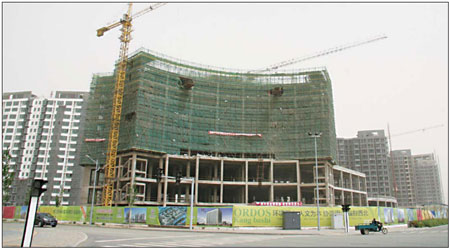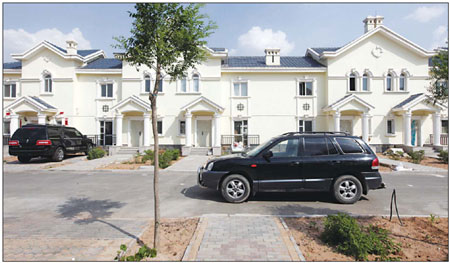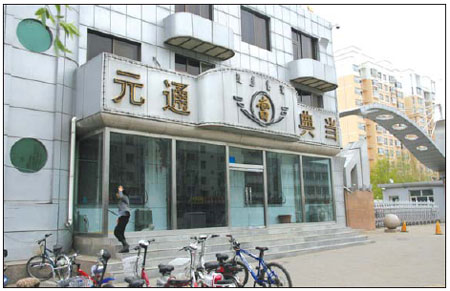Behind Ordos' boom
Updated: 2011-06-10 12:08
By Li Xiang (China Daily European Weekly)
|
|
Resource-rich inland city is the center of unregulated lending
Gao Shan, the owner of a private coal mine and a property company, had no idea what private equity (PE) was until a local fund manager approached him earlier this year with an investment proposal promising a 10-fold return within three years.
In this resource-rich inland city, surrounded by the sandy deserts prevalent in North China, Gao - who made his fortune from price surges in coal and the nation's recent property boom - is a typical wealthy entrepreneur. Like other super-rich citizens in the city, he is eager to find ways to manage and reinvest his wealth, especially at the present time, when inflation is running high.
Although PE funds are hardly new in cities such as Beijing and Shenzhen, the wealthy in Ordos, which boasts one-sixth of the nation's total coal reserves, tend to be very conservative when it comes to modern investment tools.
In addition to their obsession with the nation's red-hot property market, many of them extend high-interest private loans, a semi-legal and largely unregulated business where the average annual interest rate is 30 percent.
Despite his lack of knowledge of the PE industry, Gao decided to try his luck by investing 5 million yuan (527,000 euros) as a limited partner (LP) in the Xinze Private Equity Investment Fund, the first PE fund in Ordos. His interest was sparked by the news that the fund will invest in a manufacturer of high-speed railway equipment, the name of which Gao declined to reveal, in Shandong province that will soon list on one of China's stock markets.
"I'll just go with a 'try it and see' attitude. Five million is not much. It's like playing a round of mahjong," he says. "Besides, the prospects of the company look good. If the fund turns out to be successful, I'll invest more."
Another reason Gao decided to invest is that the fund is endorsed by the local government, which has drafted a series of favorable policies aimed at attracting PE funds and venture capital (VC).
The policies include a 100 percent tax rebate for PE firm investments in the first five years of operations. The level drops to a 50 percent tax rebate on investments made in the subsequent five years.
The government's purpose is not only to build the city into a regional center for PE and VC funds, but also to rein in informal fund flows through private lending, a well-developed but highly risky business that is closely allied to the local real estate industry and often involves illegal fundraising.
|
|
Ordos, sometimes called "China's Dubai", built its wealth on its abundance of natural resources and the regional property boom. With a population of 1.6 million, the city's per capita GDP overtook Hong Kong's last year to reach $10,451 (7,132 euros).
The city also boasts an ever-increasing number of wealthy entrepreneurs. Research conducted by the Ministry of Housing and Urban-Rural Development estimates that the city is home to more than 7,000 billionaires. The local government is flush with cash as well, gaining 53.8 billion yuan in fiscal revenue last year.
But the huge amount of personal wealth is not wholly deposited in the city's banks. Instead, a gray private-lending market has grown outside the less-developed and heavily regulated local banking industry. The local government estimates that the scale of private lending in Ordos may be as high as 100 billion yuan, roughly equivalent to the value of China's entire PE industry.
With the real interest rates on deposits remaining negative, wealthy individuals with excess spare cash have no desire to put their money in banks.
The monetary tightening policies of the People's Bank of China, designed to cut bank lending, and the nation's tightly controlled interest rates have also served to drive money underground.
State-owned banks prefer State-owned enterprises as their main clients. The fact that they are unable to charge higher interest rates to compensate for the greater risks involved in lending to small-scale companies means that they have little incentive to do so.
Therefore, private capital is being pooled through informal channels, such as pawnshops or guarantee companies, which will extend money to cash-strapped small companies that are finding it difficult to gain loans from the State-owned banks. Although Gao is reluctant to admit it, extending high-interest loans has become a common way for the rich to snowball their wealth quickly through the murky domain of underground financing, which is largely based on mutual trust between lenders and debtors.
But what concerns the local government more is that the private-lending business has become so heavily intertwined with the property market that if one crashes, the other will quickly follow.
|
|
"The central government has slammed the brakes on the property market. This is going to have a huge impact on the private-lending business," says Li Guojian, deputy mayor of Ordos.
"If housing prices start to fall, the developers - especially the smaller ones who are the major recipients of high-interest loans - will have trouble paying off their debt," Li says. "This is likely to trigger panic among the lenders, who will withdraw their money at the same time."
Suicide and debts
In April, Jin Libin, a billionaire living in Baotou in the Inner Mongolia autonomous region, committed suicide, leaving 1.237 billion yuan of private debt and 150 million yuan of legal bank loans, according to local media reports.
Jin's death caused aftershocks in the financial institutions that loaned him the money, and also delivered a warning to the government about the potential risks of private lending.
"Our purpose in encouraging the development of PE funds is to regulate the highly risky business of private lending and divert the money to equity investment," Li says.
So far, five PE funds have been established in Ordos. PE and VC firms, such as NewMargin Ventures of Shanghai, have also expressed an interest in setting up offices in the city, according to Li.
E-paper

Ringing success
Domestic firms make hay as shopping spree by middle class consumers keeps cash registers ringing in Nanjing
Mixed Results
Crowning achievement
Living happily ever after
Specials

Ciao, Yao
Yao Ming announced his retirement from basketball, staging an emotional end to a glorious career.

Going the distance
British fitness coach comes to terms with tragedy through life changes

Turning up the heat
Traditional Chinese medicine using moxa, or mugwort herb, is once again becoming fashionable



